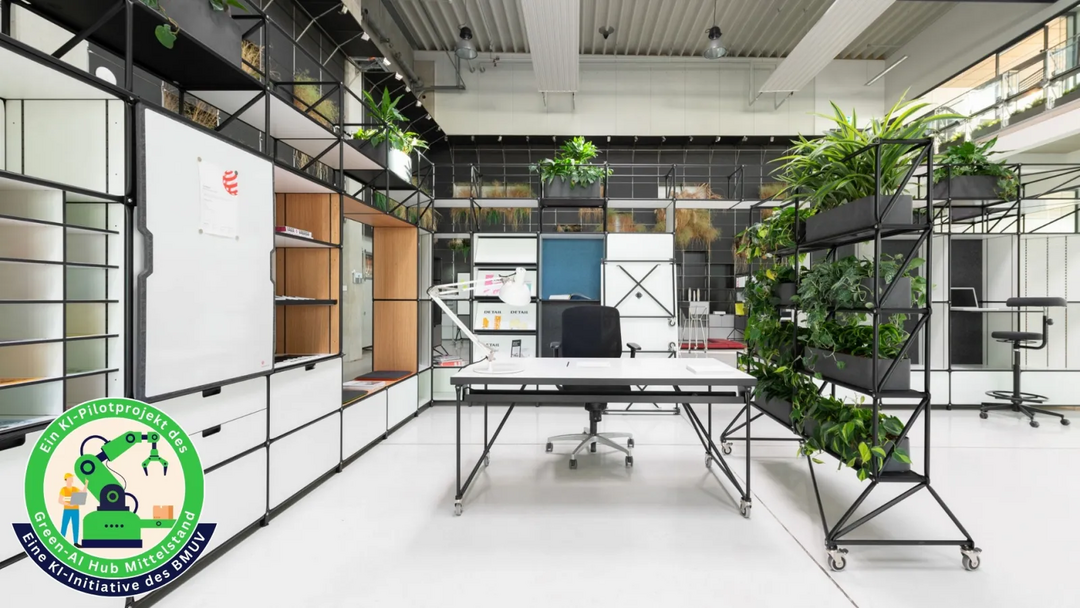The Green AI Hub Mittelstand supports companies in implementing their own AI projects with the aim of conserving resources. As part of a six-month pilot project, AI experts are developing sustainable AI solutions in SMEs. The applications are implemented directly on site, which is a special feature of the initiative. Up to 20 pilot applications are planned by the end of 2025. The developed solutions will be published as open source and freely accessible with immediate effect.
These companies are taking part in the third pilot phase:
- Nuremberg-based Fieldcode GmbH provides other companies with a platform for coordinating field service deployments. In the joint AI pilot project, a Large Language Model is being developed to optimize ticket diagnosis which should reduce the need for trips to customers. It is also possible to select the required spare parts in a more targeted manner, avoiding unnecessary purchases, shipping costs and the scrapping of spare parts that are damaged or not needed when they are shipped.
- Heismann Drehtechnik (North Rhine-Westphalia) produces precision turned parts. The challenge lies in designing the automated production processes in such a way that process stability is guaranteed. Production interruptions and disruptions require extensive readjustment by employees and lead to scrap materials. The aim of the joint AI pilot project is to reduce scrap through early error detection and optimized readjustment.
- Kalzip GmbH (Brandenburg) manufactures an aluminum roof system that serves as the outer roof layer. The aim here is to optimize the static calculations to save material. The complexity arises from a variety of factors such as alignment, material thickness, and roof geometry. As part of the pilot project, an AI-based assistant is being developed to support the calculations. The optimized statics of the roofs should reduce the amount of aluminum used.
- The company MPG (North Rhine-Westphalia) manufactures copper tubes. This can lead to quality fluctuations and production defects. The AI pilot project aims to reduce the reject rate, thereby using around 240 tonnes less copper per year while also reducing CO2 emissions. Thereby reducing the waste of copper by around 24o tonnes annually
- To achieve this, the new AI application will use existing machine data to generate knowledge that can be used to optimise parameter settings and reduce scrap.
- Pikatron GmbH (Hessen) manufactures customer-specific power electronics in small series. Many of the orders contain specific electrical and mechanical requirements. This makes it difficult to ensure consistent product quality and to document the manufacturing process. Within the AI pilot project, an AI recommendation service is being developed based on existing data sets. This should reduce development time and scrap.
- Schaltungsdruck Storz (Baden-Württemberg) produces printed circuit boards (PCBs). PCBs are complex and, despite the latest manufacturing processes, rejects often occur, which is compensated for by overproduction. To optimise this, an AI system is being developed that will create a more precise production quantity proposal. This should reduce overproduction by 80 per cent.
- System180 (Berlin) manufactures modular furniture systems. The AI pilot project aims to implement a solution that supports the return of furniture to the value creation cycle. An AI is to use image recognition to record and classify the condition. The description of the condition is then transferred to a digital product passport. This saves about 20 percent of the raw materials used, which corresponds to ten tonnes of stainless steel and 65 tonnes of wood and paper per year.
- The mechanical engineering company ULT (Saxony) develops and manufactures ventilation solutions such as extraction and filter systems. The AI pilot project is designed to determine optimal order quantities and order times for materials. Where previously an additional warehouse had to be rented and 90 per cent of parts had to be scrapped when not in use, an AI-based proposal system should now minimise storage space, optimise orders and reduce delivery trips. The aim is to save around ten tonnes of iron, copper, aluminium and plastic per year.
The Green-AI Hub Mittelstand is an AI initiative of the BMUV. As part of the German government's AI strategy, the BMUV is providing 150 million euros to promote the sustainable design of AI and the use of its opportunities for the benefit of the climate and the environment. On behalf of the BMUV, the Zukunft – Umwelt – Gesellschaft (ZUG) gGmbH is coordinating the implementation of the Green AI Hub for medium-sized companies. The German Research Center for Artificial Intelligence (DFKI), the Wuppertal Institute, the VDI Technology Centre and the VDI Centre for Resource Efficiency are taking over the operation.

